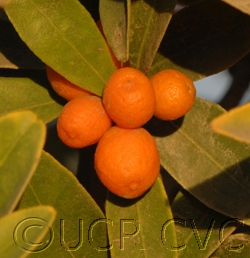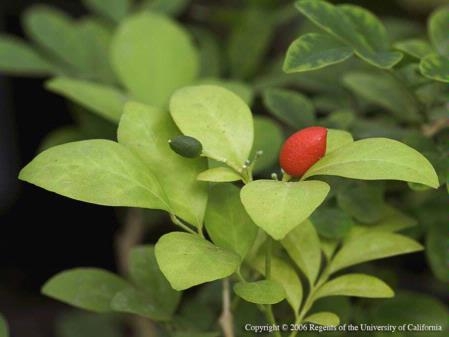- Author: Cris L. Johnson

Anna Howell, UC Ventura County Cooperative Entension's staff researcher and entomologist, will join UC advisors and California agricultural experts for a "Mite Pest Management in Strawberry" meeting in Salinas, California.
Presentations include management of destructive mites, chemical and alternative options for control and identification of mites.
Speakers will also focus on the two-spotted spider mite and Lewis Mite. Anna Howell has been part of a research project studying the Lewis Mite which has been known to cause damage in strawberry and raspberry crops. The two-spotted spider mite causes damage to strawberry in coastal areas.
Growers interested in attending:
Date: Thursday, June 27, 2013
Time: 7:30 am to 11:00 am
Location:
UC Cooperative Extension Augitorium
1432 Abbott Street
Salinas, CA
Contact: Dr. Shimat Joesph, (831) 759-7359 or svjoseph@ucdavis.edu
View the agenda here.
- Author: Cris L. Johnson

The meeting is a day of presentations and discussions on topics related to insects. Dr. Downer, an expert plant pathologist, will talk about insects that damage oaks. Bee expert, Anna Howell, will contribute a talk on using native bees for pollination.
Four hours of DPR CEU's are applied for.
Date: Tuesday, March 19, 2013
Time: 9:00 am to 4:00 pm
Location:
Los Angeles County Arboretum and Botanic Garden
301 N. Baldwin Ave.
Arcadia, CA 91007
Registration: At the door. Free for members. $15 for nonmembers.
Contact: Jim Downer, 805-645-1458
For more information see the flyer here.
Learn more about the Entomological Association of Southern California here.
- Author: Cris L. Johnson

SAVE THE DATE.... February 28, 2013.
UC Ventura County Cooperative Extension (UCCE) in cooperation with the Hansen Agricultural Center is hosting a Landscape Disease Symposium that focuses on the formation, spread and control of disease in landscape plants.
This annual event is organized by UCCE Ventura plant pathology advisor Dr. Jim Downer. He and other plant experts will speak on topics relevant to landscapers such as pathogens in fire injured trees, creating suppressive soil, wood decay, and disease from wood boring insects.
Pre-registration fee: $75.00
Door registration fee: $100.00
To register and pay online: Landscape Disease Symposium registration
Location:
Hansen Agricultural Center
14292 Telegraph Road
Santa Paula, CA
Contact: Dr. Jim Downer, ajdowner@ucanr.edu
For agenda and more information see the flyer.
Dr. Downer also writes "Landscape Notes," a newsletter with articles of interest to professional and home landscapers. You can link to these newsletters here.
- Author: Cris L. Johnson

Firewood borne diseases and pests can cause devastating damage to trees and huge financial losses to growers and the agricultural community. The simple yet important act of keeping firewood purchases local and not transporting to public areas can help prevent invasive pests such as the Asian Citrus Psyllid (ACP), gold spotted oak borer, emerald ash borer and others from gaining a foothold in your community.
For more useful information about this important effort, visit the California Firewood Task Force website. The Farm Bureau Pest Issues webpage has a list of invasive pests and diseases that could threaten Ventura County. Also check out a special presentation on ACP at the UCCE ACP Workshop webpage.
- Author: Chris M. Webb
Asian citrus psyllid, has not recently received much attention in the news media. However the pest, and the deadly bacterial disease it can carry, are still of great concern.
The Asian citrus psyllid (ACP) has now been found in eight California counties. Quarantines are in place. The psyllid by itself is not much of a problem; it is its ability to spread the fatal disease that has the potential to devastate both the California citrus industry and backyard citrus throughout the state.
Huanglongbing (HLB) is the name of the disease ACP can carry. Citrus and closely related plants are at risk. The disease is transmitted between plants by the psyllid. The psyllids transmit the disease to healthy plants and trees. After feeding on an infected plant, the ACP will transmit HLB to every other plant it feeds on.
While much outreach has focused on citrus trees, it is important to remember there are other plants that can host both ACP and HLB. This list from the University of Florida provides both the common and Latin plant name for many known hosts. Hosts include: curry leaf, ornamental orange-jasmine, and all the varieties of citrus, including kumquat, mandarin, grapefruit, orange and all of their hybrids.
Please remember to check your citrus and closely related plants regularly for signs of ACP or HLB. General information about this pest disease complex can be found on this section of the CDFA website. For local updates, the Ventura County ACP Task Force is a great source of information.




